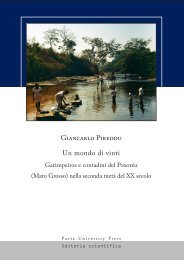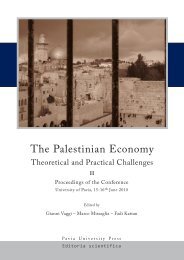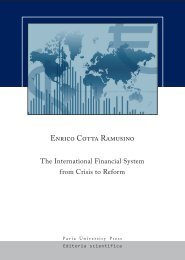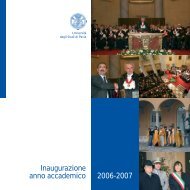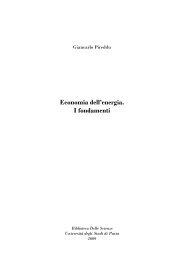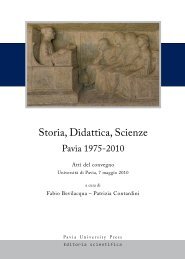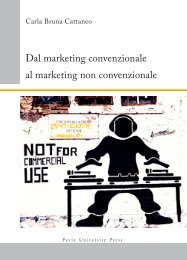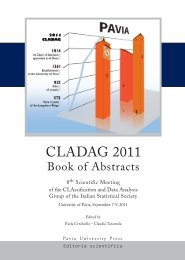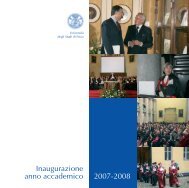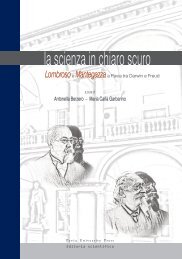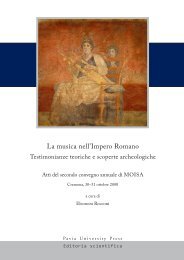La didattica dell'italiano a studenti cinesi e il progetto Marco Polo ...
La didattica dell'italiano a studenti cinesi e il progetto Marco Polo ...
La didattica dell'italiano a studenti cinesi e il progetto Marco Polo ...
Create successful ePaper yourself
Turn your PDF publications into a flip-book with our unique Google optimized e-Paper software.
136<br />
Rosella Bozzone Costa – Luisa Fumagalli – Elena Scaramelli<br />
Tiraboschi, T. − Iovino, D. (2009), Apprendere una lingua attraverso la creazione di un<br />
prodotto audiovisivo, «Journal of e-Learning and Knowledge Society», 5/3, pp. 137-141.<br />
Tiraboschi, T. (2010), Italiano per <strong>cinesi</strong> attraverso le nuove tecnologie. Percorsi di<br />
sv<strong>il</strong>uppo di lingua italiana e ab<strong>il</strong>ità linguistiche, Tesi di Dottorato non pubblicata,<br />
Università di Bergamo.<br />
Valentini, A. (1992), L’italiano dei <strong>cinesi</strong>: questioni di sintassi, Guerini Studio, M<strong>il</strong>ano.<br />
Vygotskij, L. (1990), Pensiero e linguaggio, Giunti, Firenze.<br />
Abstract<br />
In questo contributo si descrive <strong>il</strong> percorso e-learning “<strong>Marco</strong> <strong>Polo</strong>”, realizzato ad hoc<br />
per gli <strong>studenti</strong> del <strong>progetto</strong> <strong>Marco</strong> <strong>Polo</strong> dell’Università di Bergamo, a partire dall’a.a.<br />
2007-2008 e poi ampliato ogni anno. Si tratta di un percorso in modalità blended,<br />
pensato per coprire 100 ore di lavoro, di cui 50 in auto-apprendimento, con attività per<br />
«Imparare l’italiano» e per «Studiare all’Università di Bergamo» e 50 ore di lavoro in<br />
gruppi, coordinate da un e-tutor che propone e guida attività collaborative e cooperative<br />
(come, ad esempio, una caccia al tesoro online). Nei paragrafi 1-3 si presenta<br />
l’articolazione complessiva del corso per <strong>studenti</strong> “<strong>Marco</strong> <strong>Polo</strong>” così come è stata<br />
pensata al Centro di italiano per stranieri (C.I.S.) dell’Università di Bergamo, facendo<br />
un cenno anche ad alcuni principi operativi che guidano le pratiche didattiche delle<br />
lezioni in presenza e online; nel paragrafo 4.1 si descrive la parte in autoapprendimento<br />
del percorso e-learning; nel paragrafo 4.2 si esemplificano alcune attività collaborative<br />
e cooperative, mentre, nel paragrafo 5, si fa cenno a due nuovi percorsi che ampliano<br />
l’offerta della <strong>didattica</strong> a distanza.<br />
“<strong>Marco</strong> <strong>Polo</strong>” e-learning Program at the University of Bergamo: <strong>La</strong>nguage,<br />
culture and university life<br />
The article aims to describe the e-learning program <strong>Marco</strong> <strong>Polo</strong>, created in the<br />
academic year 2007-2008 and yearly updated for the students which register to the<br />
project <strong>Marco</strong> <strong>Polo</strong> at the University of Bergamo.<br />
It is a blended course of 100 work-hours, 50 of self-study with activities to “Learn<br />
Italian” and to “Study at the University of Bergamo” and 50 hours of collaborative and<br />
cooperative learning tutored by an Italian teacher (i.e. Online treasure hunt).<br />
In the paras 1-3 we describe the articulation of the <strong>Marco</strong> <strong>Polo</strong> course organised by<br />
the Centre of Italian for Foreigners (C.I.S.) of the University of Bergamo, we also<br />
briefly mention some teaching operating principles leading both the on-site presence<br />
and online lessons. Par. 4.1 presents the self-study section inside the e-learning program;<br />
in the paras 4.2 and 4.3 some collaborative and cooperative activities are exemplified<br />
and in par. 5 we mention two new e-learning programs, which amplify the already<br />
offered distance education activities.



